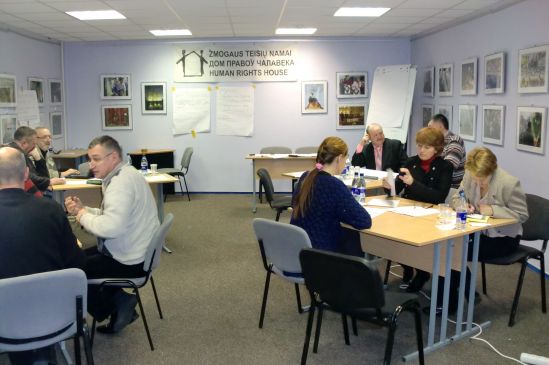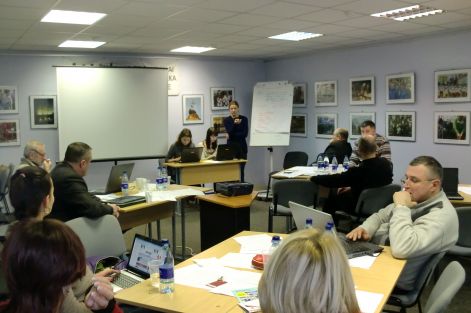Inconsistency of the national law with international standards can not be addressed by itself: the civil society in Belarus needs qualified assistance. That is why the International Law in Advocacy educational program is seen as a truly indispensable tool by both the organisers and participants.
Precisely for the same very reason the participants, human rights activists and lawyers from Belarus, have been carefully doing their homework, attended sessions and workshops of the program for over 5 years now (the first series of workshops began in 2006). At the same time to create conditions for lasting cooperation between lawyers and human rights defenders training cycles (2006-2008, 2009-2011) are divided into 5-6 workshops for each group and complimented by 1-2 additional general sessions.
Bearing first fruits
Each workshop is a unit, which aims to fully articulate the definition of a particular right or freedom, and it introduces participants to activities of international legal institutions. The current session was devoted to the freedom of peaceful assembly, the work of European Human Rights Court and conducting strategic litigations. International experts, Genrykas Mickiavičius (Lithuanian Human Rights Monitoring Institute), Sławomir Cybulsky (Polish Helsinki Committee) and Valiantsin Stefanovich (expert on Belarusian standards in the field of peaceful assembly), assisted the participants in deliberations on these issues.
According to program manager Liudmila Ulyashyn, this seminar for graduates and students of the Bring International Standards Home project was somewhat unique, since activities of graduates, which had already given practical results, were presented there.

The use of strategic litigations, creation of a journal on legal issues, an online forum and the work with government agencies were among these activities. The last one was entirely new for the program alumni. Its existence and intensification was caused primarily by the understanding of human rights defenders and lawyers of the fact that the implementation of human rights could not be postponed until the moment when a certain decision would be made by international agencies. Human rights activists and lawyers had to come out with concrete proposals on the stage of identifying the problem. A positive example of such activities, according to Ulyashyna, may be the experience of this program dimension leader, who is a member of the committee supervising the work of prisons in Homel region (South-East Belarus). She had the opportunity to monitor rights of detainees in colonies.
Theory in practice
During their training the program participants had not only received the most current knowledge in the field of international law from the invited experts, representatives of the UN High Commissioner office, the Council of Europe, Polish Helsinki Foundation, Cambridge and Oxford Universities, Belarusian and Lithuanian legal experts, but also had the opportunity to discuss cases from their own practices, share working concerns, get an advice and simply feel that they were not alone.
The latter was perhaps the most significant. According to Liudmila Ulyashyna, while remaining fragmented and disconnected, lawyers and HR activists quickly lose energy and motivation for work. "Meetings during the sessions and workshops give them the opportunity to make sure that, despite all sorts of problems, the positive dynamics still exists in the application of the standards of international law in Belarusian courts.”
This fact was confirmed by the Belarusian courts monitoring conducted by the program alumni and students of European Humanities University. "We collected and analysed more than 80 Belarusian trials court decisions in cases where lawyers or human rights defenders applied international norms. The analyses shows that Belarusian courts havesteadely started to refer to international norms due to consistent and correct applications by lawyers", – says the program manager.
However, despite this positive development, the legal quality level of national courts is still a big issue. As noted by Ms Ulyashyna, even if the Constitutional Court recognizes the supremacy of international regulations, lower courts base their decisions solely in accordance with the national law. And if lawyers or human rights defenders pay attention to the inconsistency with the latest international standards, courts do not always understand ways in which to address this problem. Obviously, this is partly related to the lack of personnel with knowledge of both the Belarusian and international law. Joint activities of the program graduates allow implementing the standards of international law in national courts. The experience of the Homel, Brest and Viciebsk centres and working groups has proven that this is possible. They have repeatedly demonstrated a high level of legal expertise in their appeals, which resulted in decisions by courts in accordance with international standards.
HR defenders and lawyers: getting rid of stereotypes
The need to establish stable and durable connections between human rights defenders and lawyers is associated with the fact that so far in the Belarusian society a stereotypical perception of human rights defenders is quite common. There are thought to be "illegal lawyers, who do not help to protect the rights of citizens, but also prevent real lawyers from doing their job right.” In this regard, human rights defenders and lawyers’ joint efforts have never been welcomed. And it has certainly not benefited the implementation of international legal standards in Belarus.
The cooperation between human rights defenders and lawyers in this program allows both sides to not only make sure that the conversation between them can occur on an equal level and in a common language, but also that their activities have a common goal. Along with this fact the understanding of an advantageous use of each other’s resources comes. Lawyers, protecting of those whose cases are in courts, not only help individual victims of human rights violations and but they also assist judges to perceive human rights as an instrument of law.
Human rights defenders also have the opportunity to perform their job better, because the specific logic of law can not always be mastered without a legal education, resulting in the fact that human rights defenders and victims of human rights violations remain unheard. Therefore, the translation of human rights defenders’ appeals into the language of lawyers is sometimes the key in providing an effective protection of affected citizens.
In addition, the opportunity to share their experiences is of paramount importance for human rights defenders and lawyers. According to the program participant, a lawyer Natallia Miatselitsa, meetings during the program are "a push for new ideas, a real chance to acquire spiritual strength to go home and act-act-act."
Perspectives
Summing up, as Natallia Miatselitsa reasonably noticed, "nothing happens right away": the process of the de-facto implementation of international law in Belarus requires both skilled personnel and time.
However, given all the civil society specifics in Belarus, the Bring International Standards Home program initiatives are seen as one step towards the establishment of international legal standards in court activities and also at the level of public relations, where each citizen knows their rights and confident that he or she will be able to protect them in court, if necessary, with the help.





